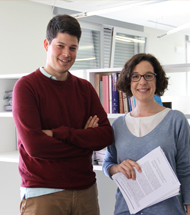The home stretch of a doctoral thesis
About to deposit their theses, ICS doctoral students Sergio Clavero and Adriana Gordejuela take stock of the four years they have spent with the tension, resilience and discoveries that make for much more than a degree

FOTO: Isabel Solana
Sergio Clavero and Adriana Gordejuela start out this academic year with anticipation and a bit of vertigo. And their feeling is fitting— before the end of the year, they will defend their theses. During the last four years, the Institute for Culture and Society (ICS), where they have learned how to start a research career, has been witness to their first achievements, as well as their moments of doubt and writer’s block. They both relate that they are happy to receive their long-awaited degree, but also know they will be taking away so much more from this stage of their lives.
"I like to know," Sergio says when talking about his decision to enroll in a PhD program. After a receiving his undergraduate degree in philosophy, he also studied a master’s at the University and thought that finding a topic within the framework of this discipline was the next natural step.
He decided to continue the work he began in his mater’s thesis, a project related to John Elster's proposal on ends and means, which led him to the contrary position maintained by another current thinker, Axel Honneth, and the relationship between bonds, identity and normativity as keys for analyzing contemporary society.
Adriana also began to consider the idea of a thesis at the end of her undergraduate studies. "From the beginning, I wanted to do something related to the ‘language’ of film, and my director, Inés Olza, showed me a whole panorama of research that I did not know existed," she says.
She adds that, after pondering a variety of options, they chose the use of flashback as an object of study "because it is a staple narrative resource in film, but, at the same time, it leaves a lot of room for stylistic creativity." Specifically, she studies "the common denominator of all flashbacks (in cognitive terms) that allows the viewer to properly understand them."
The beginning of a research careerDeciding on a topic is, according to Sergio, one of the main difficulties that all doctoral students face: "As you read the bibliography, you will inevitably discover new paths, which can thwart efforts to define a topic if you want to cover them all. Your aspiration should be to do a good job and enter into dialogue with a variety of authors, but aware that you may open up topics that you cannot conclude at the time." And he insists that a thesis "is the beginning of a research career, not its culmination. If you think you have to finish everything, you may panic."
He attests to the fact that the decision of "where to stop" is always complex because you have to realize when and where to do it. "As you advance, you realize that there are so many things that you do not know and when the defense date approaches you want to review more things, but you need to put an end to it, although always with the maximum rigor possible," he advises.
He recognizes that in addition to the balance between being self-demanding and patient with yourself, the doctorate has taught him a lot about his performance and the way he works, which he has realized is different for each researcher. In addition, he has experienced for himself how hard it is to write a handful of good pages, which has made him value his work more, and that of his colleagues. "All this helps has helped me grow," he noted.
He agrees with Adriana that the support of one’s thesis director is fundamental during the toughest moments. Adriana emphasizes that her director, Inés Olza, "has always been a source of motivation without ceasing to be demanding" and knows how "to transmit calm." This was especially important at times when she felt that the task "was too great" and had doubts related to the so-called impostor syndrome: "You think you know absolutely nothing, that you are not up to the task, the thesis, what is asked of you, etc. "
A path toward discoverySharing time with other doctoral students and listening to the experience of thesis directors and other researchers always helps, of course, but Adriana emphasizes that "some things can only be learned with a bit of tenacity and through experience. The path towards a thesis is personal and, in the process, you also learn a lot about yourself and about things that go beyond the research work you are doing." She says she would give some basic advice to 2014 Adriana on work methods and time management, "but without spoilers: there are things that are best discovered along the way."
Library hours, countless articles and monographs read, research stays abroad—Sergio at the Catholic University of the Sacred Heart in Milan, and Adriana at the University of California-Los Angeles (USA)— hundreds of paragraphs written and reviewed once and again... There have been many milestones, but everything becomes more frantic in the final stage, where their main challenge is to meet their deadlines and defend their theses before the end of 2018.
"Finishing comes with mixed feelings," Sergio reflects. "On the one hand, you want to finish once and for all to see the tangible fruit of your work, but this has also been a great stage in life and it is sad to see it end," he says. "I consider it a privilege to be able to completely dedicate a few years to a subject that I like and that serves me as a person. With this, I gained something that I would not have achieved other wise.
